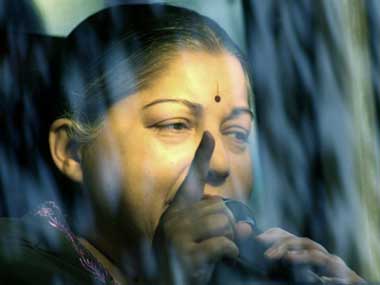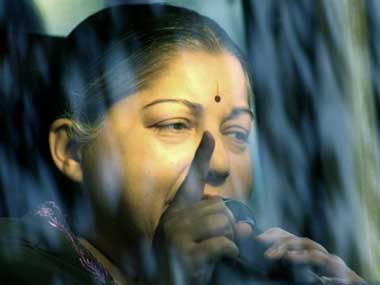Tamil Nadu chief minister J Jayalalithaa’s latest missive to Prime Minister Manmohan Singh on the training of two Sri Lankan military officers at the Defence Services Staff College in Wellington near Ooty betrays the frustration of a state against its union that doesn’t seem to respect its ethnic and political sentiments. Barely two months after nine Sri Lankan officers under training in Tambaram near Chennai had been shifted out of the state in response to her demand, Jayalalithaa has now found that the Centre had been training two more officers in the state since May without her knowledge. In her letter, she said this information was “mischievously concealed” from her showing “scant regard for the views of her government and the sentiments of the people of Tamil Nadu.” The centre’s attitude was “reprehensible”, she said. And she wanted them to be immediately sent back to Sri Lanka. [caption id=“attachment_432195” align=“alignleft” width=“380”]
 Reuters[/caption] In July, she had said the training of the officers in Tambaram amounted to “thrusting a spear in the hearts of the people of Tamil Nadu.” Jayalalithaa’s words are not mere political posturing because every political party in the state is very vocal in its demand that India should take a tough stand against Sri Lanka for its alleged war crimes against thousands of Tamil civilians in 2009. They also want India to ensure that Tamils in the island are treated on par with the Sinhalese. Except for a couple of small outfits, no mainstream party has been overtly supportive of the LTTE, but they have been clearly united on the Sri Lankan Tamil issue. Although the centre hasn’t officially responded to Jayalalithaa’s letter, an Indian newspaper that has been prompt to carry the voice of the Sri Lankan establishment reported that New Delhi “may ignore” her demand. The report also reiterated Sri Lanka’s defiant stand that its relationship is with Delhi, implying that it couldn’t care less about the voices of protest from Tamil Nadu. This is exactly why Jayalalithaa’s statement is significant and needs to be pursued with more political vigour. Caught between the sentiments of Tamil Nadu and its own geopolitical compulsions, New Delhi has been dubious in its stand on the Sri Lankan Tamil issue, whether it was before, during or after the 2009 war. When the international community and the West were incensed at the alleged atrocities by the Sri Lankan army against the Tamil civilians of the north, India did precious nothing to stall the fighting. Instead, after the war, it handed over a handsome amount of money to take care of the rehabilitation of the remaining Tamils who had been displaced in masses. Sri Lanka’s record has been dismal on all these counts, especially going by the charges of the international community and the UN. Fixing responsibility for the alleged war crimes by the Sri Lankan army, militarisation of the North as well as changing the demography of Tamil populated areas still remain unresolved issues despite considerable international pressure. Even with an UNHRC resolution against the country, Sri lanka continues to remain self-righteous and abrasive. India, despite the genuine demands and wounded sentiments from Tamil Nadu, has remained soft on the island nation and mostly indulged in long-winding diplomatese. It now turns out that it has been hiding things as well. What is most disconcerting is the lack of transparency of the centre in its deals with Colombo, and the secretive nature of some of them. In a country that is seen as a model for federalism, it is indeed reprehensible that the centre chose to train the Sri Lankan military personnel in Tamil Nadu whose sentiments on the issue have been loud and clear. Tamil Nadu has one more reason to be indignant: the alleged attacks of its fishermen by Sri Lankan navy and the centre’s inaction on the issue. The most recent incident reportedly involved the torture of Tamil fishermen who had been captured by Sri Lanka. Jayalalithaa and other politicians have been demanding strong action from the Centre and have even advocated taking back Kachchatheevu that the country once gave away. As in the last episode, the centre will most likely shift the two Lankan officers out of the state and place them elsewhere in the country. Jayalalithaa in fact wants the centre to send them back and not train them anywhere else in the country either. Tamil Nadu’s demand stems from the simple principle that India should not train personnel of the Sri Lankan forces who are charged with human rights abuses and war crimes against ethnic Tamils. Politically, her demand is more than fair. It’s about a nation’s commitment to its own people. It may sound like a difficult choice for Delhi, but in practical terms it is not. It has to get tough and get over the bogeys of China and Pakistan that Sri Lanka is brandishing effectively. What it has done so far amounts to overlooking the sentiments of its own people; that too from a socio-culturally, politically and economically significant state such as Tamil Nadu; and siding with a nation that has been globally slammed for its alleged war crimes and human rights violations. Perhaps issues such as this should be handled by seasoned politicians and not by “diplomats” whose geopolitical decisions are politically deficient. It’s also such a pity that a chief minister has to write again and again to the centre on the same issue. Federalism should not be its own enemy.
Reuters[/caption] In July, she had said the training of the officers in Tambaram amounted to “thrusting a spear in the hearts of the people of Tamil Nadu.” Jayalalithaa’s words are not mere political posturing because every political party in the state is very vocal in its demand that India should take a tough stand against Sri Lanka for its alleged war crimes against thousands of Tamil civilians in 2009. They also want India to ensure that Tamils in the island are treated on par with the Sinhalese. Except for a couple of small outfits, no mainstream party has been overtly supportive of the LTTE, but they have been clearly united on the Sri Lankan Tamil issue. Although the centre hasn’t officially responded to Jayalalithaa’s letter, an Indian newspaper that has been prompt to carry the voice of the Sri Lankan establishment reported that New Delhi “may ignore” her demand. The report also reiterated Sri Lanka’s defiant stand that its relationship is with Delhi, implying that it couldn’t care less about the voices of protest from Tamil Nadu. This is exactly why Jayalalithaa’s statement is significant and needs to be pursued with more political vigour. Caught between the sentiments of Tamil Nadu and its own geopolitical compulsions, New Delhi has been dubious in its stand on the Sri Lankan Tamil issue, whether it was before, during or after the 2009 war. When the international community and the West were incensed at the alleged atrocities by the Sri Lankan army against the Tamil civilians of the north, India did precious nothing to stall the fighting. Instead, after the war, it handed over a handsome amount of money to take care of the rehabilitation of the remaining Tamils who had been displaced in masses. Sri Lanka’s record has been dismal on all these counts, especially going by the charges of the international community and the UN. Fixing responsibility for the alleged war crimes by the Sri Lankan army, militarisation of the North as well as changing the demography of Tamil populated areas still remain unresolved issues despite considerable international pressure. Even with an UNHRC resolution against the country, Sri lanka continues to remain self-righteous and abrasive. India, despite the genuine demands and wounded sentiments from Tamil Nadu, has remained soft on the island nation and mostly indulged in long-winding diplomatese. It now turns out that it has been hiding things as well. What is most disconcerting is the lack of transparency of the centre in its deals with Colombo, and the secretive nature of some of them. In a country that is seen as a model for federalism, it is indeed reprehensible that the centre chose to train the Sri Lankan military personnel in Tamil Nadu whose sentiments on the issue have been loud and clear. Tamil Nadu has one more reason to be indignant: the alleged attacks of its fishermen by Sri Lankan navy and the centre’s inaction on the issue. The most recent incident reportedly involved the torture of Tamil fishermen who had been captured by Sri Lanka. Jayalalithaa and other politicians have been demanding strong action from the Centre and have even advocated taking back Kachchatheevu that the country once gave away. As in the last episode, the centre will most likely shift the two Lankan officers out of the state and place them elsewhere in the country. Jayalalithaa in fact wants the centre to send them back and not train them anywhere else in the country either. Tamil Nadu’s demand stems from the simple principle that India should not train personnel of the Sri Lankan forces who are charged with human rights abuses and war crimes against ethnic Tamils. Politically, her demand is more than fair. It’s about a nation’s commitment to its own people. It may sound like a difficult choice for Delhi, but in practical terms it is not. It has to get tough and get over the bogeys of China and Pakistan that Sri Lanka is brandishing effectively. What it has done so far amounts to overlooking the sentiments of its own people; that too from a socio-culturally, politically and economically significant state such as Tamil Nadu; and siding with a nation that has been globally slammed for its alleged war crimes and human rights violations. Perhaps issues such as this should be handled by seasoned politicians and not by “diplomats” whose geopolitical decisions are politically deficient. It’s also such a pity that a chief minister has to write again and again to the centre on the same issue. Federalism should not be its own enemy.
Jaya is right: Stop training Sri Lankan military in TN
G Pramod Kumar
• August 27, 2012, 16:25:46 IST
Tamil Nadu’s demand stems from the simple principle that India should not train personnel of the Sri Lankan forces who are charged with human rights abuses and war crimes against ethnic Tamils. Politically, her demand is more than fair.
Advertisement
)
End of Article